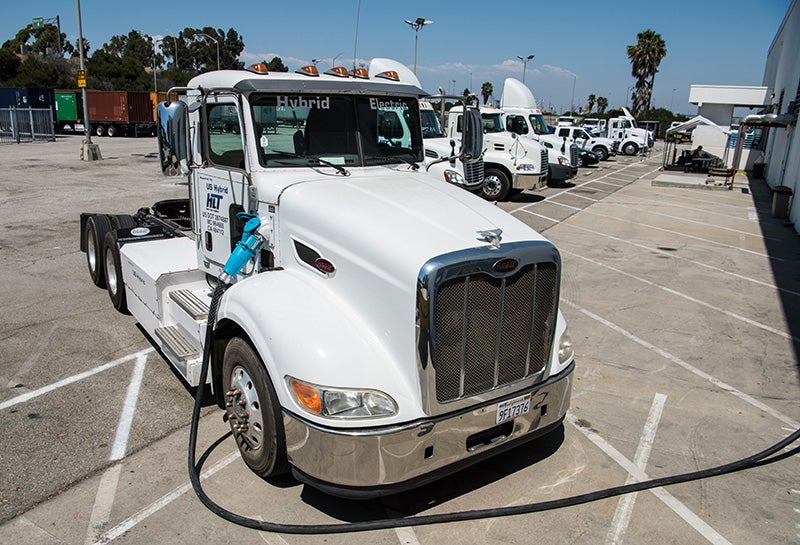Electrifying Washington’s freight trucks will protect our climate and our health
The Washington State Legislature set aside $120 million to address emissions from freight transportation by electrifying trucks and buses
When we talk about zero-emission transportation in Washington, we often focus on cars and public transit because they’re familiar. However, reducing pollution from goods movement and its impact on near-port communities is equally important, and critical for health equity.
This year the Washington State Legislature made a substantial investment to address emissions from freight transportation by setting aside $120 million in funding over a two-year period from the state’s Climate Commitment Act (CCA) to help electrify Washington’s truck and bus fleet.
The funding, provided in Washington State’s final transportation budget for 2023-2025, will allow for the use of incentives to electrify a wide range of trucks and buses including semi-trucks, refuse trucks, school buses, delivery vans, and importantly, heavy-duty freight trucks, including short-haul freight trucks known as drayage trucks, while also investing in infrastructure to charge these vehicles.
In taking this major step to reduce emissions and address health equity, the legislature provided two pots of funding — $100 million to help electrify medium and heavy-duty vehicles and provide infrastructure to keep those vehicles powered plus $20 million for early-action demonstration projects to help determine the best path forward. A working group established by the legislature will decide how best to spend the funding.
In developing the incentives for truck electrification, Washington should focus on electrifying the dirtiest vehicles — drayage trucks. Powered by diesel that spews noxious air pollutants, drayage trucks are often the oldest and dirtiest on the road. They travel through communities delivering e-commerce deliveries, furniture, and all freight coming into ports to distribution hubs. Pollution from these trucks especially impacts people who live closest to the freight movement, causing respiratory diseases and cancer. These near-port communities, which are often low-income communities of color, face cumulative pollution burdens from drayage trucks, nearby ships, highways, and distribution centers. One community particularly affected is the Duwamish Valley, which has some of the highest diesel pollution levels in Washington State and the nation.
Drayage trucks are ideal candidates for electrification because they travel short distances and can recharge during stops. However, electric trucks are expensive, and without financial incentives, are out of reach for most drivers. Further, the owner-operators who drive these trucks often live in environmental justice communities, work long hours for low-wages, and lack the financial savings to upgrade their vehicles. An electrified trucking solution must work financially for drivers to ensure a just transition. Partnership-led demonstration projects such as the Heavy-Duty Vehicle Incentive Pilot in the City of Seattle exemplify a shovel-ready program that centers racial equity while ensuring air-quality improvement from drayage truck electrification.
In Washington State, transportation emissions are the largest producer of greenhouse gases, accounting for almost half of our state’s greenhouse gas emissions. Diesel vehicles alone contribute nearly 9% of the total statewide greenhouse gas. Electrifying the drayage fleet would substantially reduce our state’s carbon emissions while improving air quality in near-port communities.
We applaud the use of this funding to help incentivize the electrification of vehicles including drayage trucks and urge the legislature to center highly impacted communities as it rolls out program funding. In doing so, Washington will ensure this investment not only modernizes freight movement, but also protects the health of Washington residents cumulatively burdened by air pollution, while minimizing the impact on our environment. We thank the legislature for this crucial step forward and will continue to be engaged to ensure communities disproportionately affected by fossil fuel pollution will reap the intended benefits.
Further, considering the recent adoption of the Advanced Clean Fleets rule in California, Washington has yet another opportunity to quickly move to reduce GHG (greenhouse gas) emissions from the trucking sector by ensuring fleet operators transition their trucks to zero-emission vehicles by adopting this emission standard.
Established in 1987, Earthjustice's Northwest Regional Office has been at the forefront of many of the most significant legal decisions safeguarding the Pacific Northwest’s imperiled species, ancient forests, and waterways.
Zoe Woodcraft
Public Affairs and Communications Officer, Earthjustice
zwoodcraft@earthjustice.org
